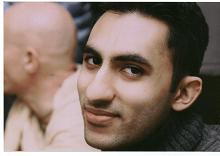I’m not sure exactly when I first read Animal Farm but I do know that my older sister brought it home from school as assigned reading. I devoured the small paperback – partly because it was good, mainly because reading my sister’s books made me feel like I was at least as smart as she. It was only several years later that I would truly appreciate how profound and insightful Orwell’s “fairy tale” really is.
Last year while speaking on a panel at the Kuli Mela, I found myself referencing Animal Farm’s chilling conclusion to a roomful of second-generation Krishna devotees: we have to be careful, I warned, not to become the very thing which we are fighting against.
I had the sudden urge to re-read the book on Wednesday night last week, as if brushing up on Animal Farm would help me prepare myself for the North American GBC and Temple Presidents Meetings (they run from Thursday to Sunday) in Dallas. It made me think: will I attend these meetings and sound the horn (conch shell) of revolution year after year; slowly climbing the corporate ladder of ISKCON, only to wake up one morning (X years from now) transformed into the type of old-school, stodgy, out of touch ISKCON bureaucrats that I am constantly railing against now?
I wonder, for that matter, if some of those stodgy prabhus once raised their own flags and dreamt up their own revolutions. How many of them were forced to sacrifice their own visions and ideals on the altar of middle management? Were their weary eyes once filled with stars and fixed on limitless possibilities? I wonder if they started out determined to think outside the box, and unwittingly ended up becoming border police, themselves rigidly guarding the lines around a new box.
It is humbling. My false ego wants to convince me that I am a visionary or great strategist, and that, ultimately, I am the controller. But in these honest moments of reflection, I am forced to admit that I am not so different from those who I may critique. Those moments serve as reminders to act with humility, empathy, and detachment, and to vigilantly guard against arrogance.
Still, I am aware that even with the best intentions, time will have its way with me. I hope not, but if history is any indication, I am already well on my way to becoming a fossil waiting to be respectfully displaced by the youth of tomorrow. It is depressing, but – in a way – oddly comforting. I like thinking of the possibility that I may already be outdated; that somewhere out there, some new revolutionary may already be planning to better the world for Krishna, in his own vibrant way. I just hope that before he puts me out to pasture, he’s had a chance to get himself a copy of Animal Farm.
.vbd.
Last year while speaking on a panel at the Kuli Mela, I found myself referencing Animal Farm’s chilling conclusion to a roomful of second-generation Krishna devotees: we have to be careful, I warned, not to become the very thing which we are fighting against.
I had the sudden urge to re-read the book on Wednesday night last week, as if brushing up on Animal Farm would help me prepare myself for the North American GBC and Temple Presidents Meetings (they run from Thursday to Sunday) in Dallas. It made me think: will I attend these meetings and sound the horn (conch shell) of revolution year after year; slowly climbing the corporate ladder of ISKCON, only to wake up one morning (X years from now) transformed into the type of old-school, stodgy, out of touch ISKCON bureaucrats that I am constantly railing against now?
I wonder, for that matter, if some of those stodgy prabhus once raised their own flags and dreamt up their own revolutions. How many of them were forced to sacrifice their own visions and ideals on the altar of middle management? Were their weary eyes once filled with stars and fixed on limitless possibilities? I wonder if they started out determined to think outside the box, and unwittingly ended up becoming border police, themselves rigidly guarding the lines around a new box.
It is humbling. My false ego wants to convince me that I am a visionary or great strategist, and that, ultimately, I am the controller. But in these honest moments of reflection, I am forced to admit that I am not so different from those who I may critique. Those moments serve as reminders to act with humility, empathy, and detachment, and to vigilantly guard against arrogance.
Still, I am aware that even with the best intentions, time will have its way with me. I hope not, but if history is any indication, I am already well on my way to becoming a fossil waiting to be respectfully displaced by the youth of tomorrow. It is depressing, but – in a way – oddly comforting. I like thinking of the possibility that I may already be outdated; that somewhere out there, some new revolutionary may already be planning to better the world for Krishna, in his own vibrant way. I just hope that before he puts me out to pasture, he’s had a chance to get himself a copy of Animal Farm.
.vbd.


1 comment:
A good mature realisation. It helps because it may lead you to instead of attacking the negatives to reinforce the positives.
Be careful it doesn't become a rationalization for complacency.
Guys like you often find yourselves between the crows and the swanabees and that can be discouraging. Press on.
The challenge is how to be tolerant and at the same time continue to try "right the wrong".
Madhava Gosh
Post a Comment